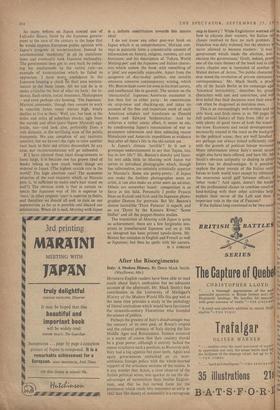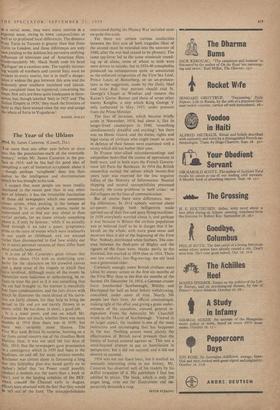After the Risorgimento Italy: A Modern History. By Denis Mack
Smith. (Mayflower, 60s.) HITHERTO English readers have been able to read much about Italy's unification but no adequate account of the aftermath. Mr. Mack Smith's fine contribution to the University of Michigan's History of the Modern World fills this gap and at the same time provides a study in The pathology of liberal institutions which would have fascinated the sixteenth-century Florentines who founded the science of politics.
Perhaps the greatest of Italy's disadvantages was the memory of its own past, of kome's empire and the cultural primacy of Italy during the late Middle Ages and Renaissance. Italians assumed as a matter of course that their country should be a great power, although it entirely lacked the means to achieve such a position; as Bismarck said, Italy had a big appetite but poor teeth. Again and again governments embarked on an over- ambitious foreign policy with the whole-hearted support of the articulate sections of the nation. Is it any wonder that Acton, a close observer of the Italian political scene, was quicker to see the dis- advantages of nationalism than insular English- men, and that he has earned fame for the prescience which made him announce as early as 1862 that 'the theory of nationality is a retrograde
step in history'? While Englishmen worried a how to educate their masters, the Italian rt classes resolved to face no such problem. franchise was duly widened, but the electors W never allowed to become masters : it was government which made the election, not election the government.' Graft, indeed, pros one of the main themes of the book and in all every chapter one is reminded of another brated dictum of Acton, 'No public charactet ever stood the revelation of private utterance correspondence.' Mr. Mack Smith, a prac ally of Sir Isaiah Berlin in his campaign ag 'historical inevitability,' describes his prim characters with zest and conviction, and wi firm belief that their decisions were their own can often be diagnosed as mistaken ones.
This is an outstandingly well-written and r able book and finds room in its 500 pages f& full political history of Italy from 1861 to 19 with plenty of good views of both the wood the trees. Economic and social developments necessarily treated in the main as the backgrc to the political scene; they are well handled are perhaps not always linked sufficiently cic with the growth of political labour movemi More information about Italy's social staic might also have been offered, and here Mr. Iv Smith's obvious antipathy to dealing in absir5 forces has its disadvantages. Is it possibb explain the poor morale of the Italian mill forces in both world wars except by reference the enormous social gulf between officers 'other ranks'? And again, doesn't the tendi ii of the professional classes to combine small-s land-holding with their other activities hell explain their terror of the Left and their important role in the rise of Fascism?
If the Italians long continued to be 'two nati
Ii tl
ea in a social sense, they were many nations in a regional sense, owing to town catnpanilismo as Well as to profound local differences. The distance from Turin to Taranto is greater than that from Turin to London, and these differences are only now yielding to the dubious but pervasive unifying Influences of television and of American films. 'Understandably Mr. Mack Smith ends his brief 'Epilogue' on a cautious note. The rapidly increas- lug wealth of northern and central Italy must be evident to every tourist, but is in itself a danger, since it widens the gap between this area and the hideously poor southern mainland and islands. One complaint must be registered, concerning the !naps. Not only are these quite inadequate in them- selves, but, though labelled 'Italy in 1925' and 'The Italian Empire in 1939,' they mark the frontiers of Italy as they have existed since the war and assign the whole of Istria to Yugoslavia!
DANIEL WALEY



































 Previous page
Previous page